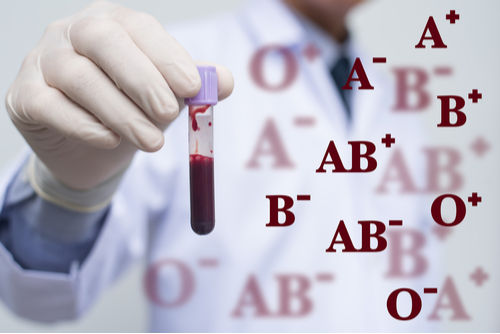Heart Conditions
Does Your Blood Group Affect Your Risk Of Heart Attack?
3 min read
By Apollo 24|7, Published on - 04 May 2022, Updated on - 18 October 2022
Share this article
0
1 like

Have you wondered what role your blood group play in your health? Unless you are a blood donor or someone who needs a blood transfusion, it is highly likely that you haven’t thought much about it. Truth be told, most of us don’t really care much about our blood groups. Nevertheless, emerging scientific evidence suggests that people with certain blood groups may have a higher risk of heart attack than those with other blood groups. The article explores this correlation between blood group and risk of heart attacks in detail below.
Types of Blood Groups
There are 4 main types of blood groups - A, B, AB, and O. Your blood group is based on the form of the ABO gene you inherit from your parents.
Furthermore, if you have type AB blood, then you have A and B antigens present on your RBCs. The antigen is a type of protein molecule that is found on the surface of red blood cells (RBCs). On the other hand, if you have type O blood, no antigens would be present on your RBCs.
Your blood group may be ‘positive’ or ‘negative’, depending on whether your red blood cells have a protein called RhD antigen or not. The presence of the protein makes the blood group RhD positive, or else it would be RhD negative.

How Does Your Blood Group Affect Your Risk of Heart Attack?
While there is some inconsistency in the research findings, most of the following studies note that people with type A, type B or type AB blood have a slightly higher risk of heart disease, heart attack and heart failure than those with type O blood.
- A study published in August 2012 including more than 20 years of data from thousands of participants found that compared to O type, blood groups AB, B, and A were linked to a 23%, 11%, and 5% higher risk of heart disease, respectively.
- The findings of a large study published in May 2017 noted that having a non-O blood group is associated with a 9% higher risk of a heart attack.
- Another research published in January 2020 noted that compared to people with type O blood, those with type A or B blood group had a combined 8% higher risk of heart attack and 10% bigger risk of heart failure.
While scientists are yet to clearly identify the link between blood groups and the risk of heart diseases and heart attacks, some theories that can help prove the point include:
- Non-O blood groups may be at a greater risk of cardiovascular events because they have higher levels of von Willebrand factor, a protein that plays a key role in blood clotting.
- People with non-O blood groups, especially those with A blood group, generally have higher cholesterol.
- These people also have a higher concentration of galectin-3, a protein that is involved in inflammation and has been linked to poor outcomes in heart failure patients.
What You Can Do To Reduce The Risk?
Right now, there are no guidelines for reducing the risk of a heart attack in a specific blood group. Experts recommend sticking to a healthier lifestyle, such as eating a nutritious diet, regular exercise, maintaining a healthy weight, reducing stress, not smoking, and limiting exposure to air pollution, to limit the risk. However, health experts suggest that the blood groups at risk should be considered for assessing the risk of cardiovascular events such as heart attack, along with other factors such as cholesterol, blood glucose levels, age, sex and systolic blood pressure.
One must understand that the aforementioned studies do not confirm the risk of heart diseases in any specific blood group. Therefore, everyone must follow a heart-healthy lifestyle to keep the diseases at bay. You can also consult a qualified cardiologist to know more about ways to protect your heart health.
Heart Conditions
Leave Comment
Recommended for you
.jpg?tr=q-80)
Heart Conditions
Hypertension-Friendly Foods: What to Eat and What to Skip
We live in a world of abundance, with an overwhelming variety of foods. Our choices are influenced by more than just hunger; personal taste, family preferences, cultural influences, emotional reasons, health concerns, societal pressures, convenience, cost, and the variety and quantity of available options all play a role. These decisions significantly impact our bodies, especially when managing conditions like hypertension.

Heart Conditions
These Lifestyle Changes Can Save You From A Heart Attack
An unhealthy diet and a sedentary lifestyle are major risk factors for heart disease and heart attacks. Read on to know what can help you reduce the risk of a heart attack.

Heart Conditions
What Tests Can Reveal Hidden Heart Problems?
People with diagnosed heart conditions as well as healthy individuals to get themselves tested for hidden heart diseases that may not often have clear warning signs.
Subscribe
Sign up for our free Health Library Daily Newsletter
Get doctor-approved health tips, news, and more.
Visual Stories

World Heart Day 2021: Take charge of your health
Tap to continue exploring
Recommended for you
.jpg?tr=q-80)
Heart Conditions
Hypertension-Friendly Foods: What to Eat and What to Skip
We live in a world of abundance, with an overwhelming variety of foods. Our choices are influenced by more than just hunger; personal taste, family preferences, cultural influences, emotional reasons, health concerns, societal pressures, convenience, cost, and the variety and quantity of available options all play a role. These decisions significantly impact our bodies, especially when managing conditions like hypertension.

Heart Conditions
These Lifestyle Changes Can Save You From A Heart Attack
An unhealthy diet and a sedentary lifestyle are major risk factors for heart disease and heart attacks. Read on to know what can help you reduce the risk of a heart attack.

Heart Conditions
What Tests Can Reveal Hidden Heart Problems?
People with diagnosed heart conditions as well as healthy individuals to get themselves tested for hidden heart diseases that may not often have clear warning signs.